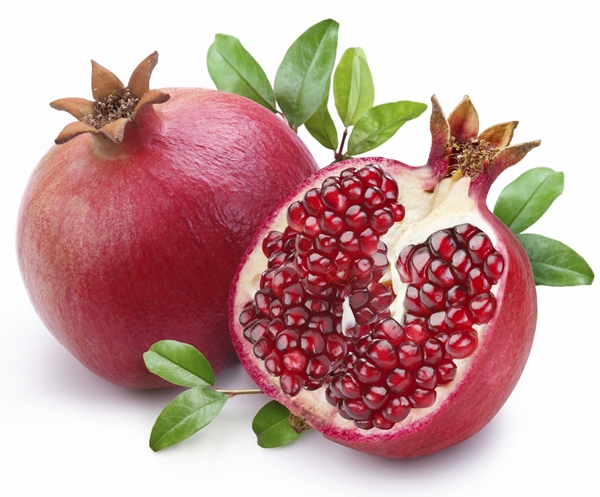 Here’s a fruit that often gets forgotten when most people buy their weekly groceries: pomegranate. This delicious fruit with the tiny seeds is actually super healthy and could help prevent the onset of some common diseases. Pomegranate may also be good for slowing the natural wear and tear that occurs with aging.
Here’s a fruit that often gets forgotten when most people buy their weekly groceries: pomegranate. This delicious fruit with the tiny seeds is actually super healthy and could help prevent the onset of some common diseases. Pomegranate may also be good for slowing the natural wear and tear that occurs with aging.
Pomegranates are full of antioxidants. The seeds contain polyphenols that pack a bigger antioxidant punch than cranberries or even green tea. Pomegranates deserve superfood status. They could help protect your heart and could help to keep you cancer-free.
Recent research has suggested that drinking pomegranate juice could have beneficial effects on the heart. The antioxidant-rich juice could lower blood pressure, improve the flow of blood, and help control LDL cholesterol levels.
One other exciting area of pomegranate research involves prostate cancer. Some studies have suggested a positive effect for pomegranate juice against prostate cancer cells. One recent study, however, set out to show that pomegranates could prolong PSA doubling time in the early stages of prostate cancer. The Swiss research team had a cohort of men consume 500 ml every day for four weeks. The men then consumed 250 ml of pomegranate juice each day for another four weeks. They compared this group to one that acted as a placebo. The researchers found that PSA scores didn’t differ between the groups.
Results were more promising in a clinical trial that looked at the effectiveness of pomegranate juice in halting breast cancer progression. Breast cancer is the second leading cause of cancer death in North America. The researchers tested pomegranate juice against two different breast cancer lines. They found that the pomegranate extract inhibited the growth of cancer cells and also decreased cancer cell migration, making it much harder for breast cancer cells to take hold and spread.
Now, one more point to cover about pomegranates. Like many people, you may be turned off by the fruit simply because it looks like a challenge to get at all those little seeds—pomegranate skin is quite tough, after all. However, here are some simple tips that can have you peeling a pomegranate in a jiffy.
All you need to peel and deseed your pomegranate is a good knife, a cutting board, and a colander. Start by cutting off the crown of the pomegranate. Next, make lines in the peel by using the knife to score the sides of the pomegranate—work clockwise around the fruit. Don’t press too firmly—you don’t want to actually cut into the pomegranate.
Next, put the pomegranate into a bowl and cover with water. Break the pomegranate into sections by pulling on the peel. Separate the seeds from the white pulpy part. The seeds should end up at the bottom of the bowl, while the pulp should be floating at the top. Strain away the pulp, then pour the seeds into a colander. Drain the water, and voila! You have a big handful of delicious pomegranate seeds ready to eat!
Sources:
Beck, L., “Pomegranate: A ‘superfood’ that goes straight to your heart,” Globe and Mail web site, Dec. 4, 2013; http://www.theglobeandmail.com/life/video-the-best-way-to-seed-a-pomegranate/article608882/?from=15742280, last accessed Dec. 11, 2013.
Stenner-Liewen, F., et al., “Daily Pomegranate Intake Has No Impact on PSA Levels in Patients with Advanced Prostate Cancer – Results of a Phase IIb Randomized Controlled Trial,” J Cancer. August 2013; 4(7): 597-605.
Rocha, A., et al., “Pomegranate juice and specific components inhibit cell and molecular processes critical for metastasis of breast cancer,” Breast Cancer Res Treat. December 2012; 136(3): 647-58.
Ropacki, S.A., et al., “Pomegranate Supplementation Protects against Memory Dysfunction after Heart Surgery: A Pilot Study,” Evid Based Complement Alternat Med 2013; 2013: 932401.
